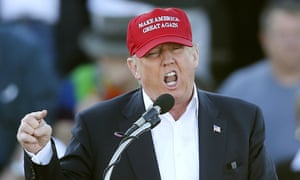Extract from The Guardian
When there is upheaval within China’s own borders – riots, protests, vicious political power struggles – hardly a sniff of it will be found in the pages of the country’s heavily-controlled press.
When it happens elsewhere – and particularly when it underscores the perils and pitfalls of democracy – it becomes front-page news.lling Tiananmen Square protest a 'riot' Such is the case of Republican presidential frontrunner Donald Trump, who, for China’s authoritarian rulers, has become the latest example of how allowing the masses a say in choosing their leaders is a bad idea.
“The rise of a racist in the US political area worries the whole world,” the party-controlled Global Times crowed this week ahead of of Trump’s victory in the latest round of primaries. “He has even been called another Benito Mussolini or Adolf Hitler by some western media.”
It added, darkly: “Mussolini and Hitler came to power through elections, a heavy lesson for western democracy.”
Trump, or “Chuanpu” as they call him in China, has been a gift to Communist party spin doctors paid to convince the country’s 1.4 billion citizens that rule of the people is a sure path to chaos and destruction.
“They are relishing this moment,” says Zhou Fengsuo, a US-based democracy activist who fled his native China following the deadly 1989 Tiananmen crackdown. “They are very happy. They are laughing over this.
“To them [Trump] is a good character to show the deficiencies of the democratic system, that such a person could become president. It is just unbelievable. Beijing is definitely gloating over this.”
Nick Bisley, professor of international relations and executive director of La Trobe Asia, says the rise of such a divisive politician provided perfect ammunition for the rulers of one-party China to argue that democracy was bad not just for it but for the world.
“It produces buffoons. It’s carnivalesque. It is decadent,” Bisley says. Trump “fulfils in a lot of respects the stereotypes of this capitalist boss figure: a decadent westerner who shoots off with his mouth and fires off all sorts of racist, crazy comments.
“If it wasn’t true you would think it was made up. It fits perfectly the messaging they have put out [about democracy].”
Chinese newspapers, which have previously pounced on the Arab Spring and Ukraine’s Maidan revolution as evidence of the dangers of democracy, have wasted no time in hyping the potential turmoil that Trump’s rise could bring.
An editorial in the Chinese-language edition of the Global Times noted with glee that fighting had broken out at Trump rallies in what was supposedly one of the world’s “most developed and mature democratic election systems”.
Even China’s leaders have joined in, albeit in less rambunctious terms. The fight for the White House had been “lively”, premier Li Keqiang quipped at a press conference in Beijing on Wednesday.
Trump’s portrayal of the 1989 Tiananmen massacre as a “riot” will have endeared him further to Beijing. China’s Communist leaders sought to justify their decision to use violence to crush the pro-democracy protests by claiming they had been facing a “counter-revolutionary riot”.
“As a survivor I was really enraged by his attitude and his comment,” Zhou, who now lives in California, says of Trump’s claim. “This is someone who is running to be the president of the most powerful democracy in the world. It really astonished me.”
On a superficial level, says Bisley, Beijing would be ecstatic at the emergence of a “buffoonish, clownish, evil boss” who captures the “chaos of democracy” so well. But on a deeper level there will be serious concerns in China’s corridors of power about the prospect of having to deal with a Trump administration.
“If I was them I would have very mixed feelings about it,” Bisley says. “On the one hand, in the short-term it is great for the propaganda bureau and it is great for the sense of China as a model that works better than some of the others.
“But if you fast forward – let’s imagine he wins, which I still think is unlikely, but is plausible in a way it wasn’t a few months ago – if you are a Chinese state councillor or in the foreign ministry dealing with an America run by Trump, it is going to be really unpredictable.
“Like it or not, I think the Americans and the Chinese had worked out a reasonably sensible way of doing business with one another under Obama and the second half of the Bush administration,” Bisley adds.
“That playbook goes out the window if you have President Donald Trump. Whether it is trade wars, a significant trade contest, whether it is mercantilism more generally, whether is a much more combative militaristic approach – who knows what he will actually do? But I think that unpredictability unsettles everyone in the region.”
For now, though, China’s party-controlled media is still revelling in the rise of the man it calls “big mouth” Trump.
“Even if Trump is simply a false alarm, the impact has already left a dent,” the Global Times bragged this week. “The US faces the prospect of an institutional failure, which might be triggered by a growing mass of real-life problems.”
An editorial on another government-run website claimed Trump had “humiliated” the US political system.
“He has turned the election into a prank,” it said.
Additional reporting by Christy Yao

No comments:
Post a Comment